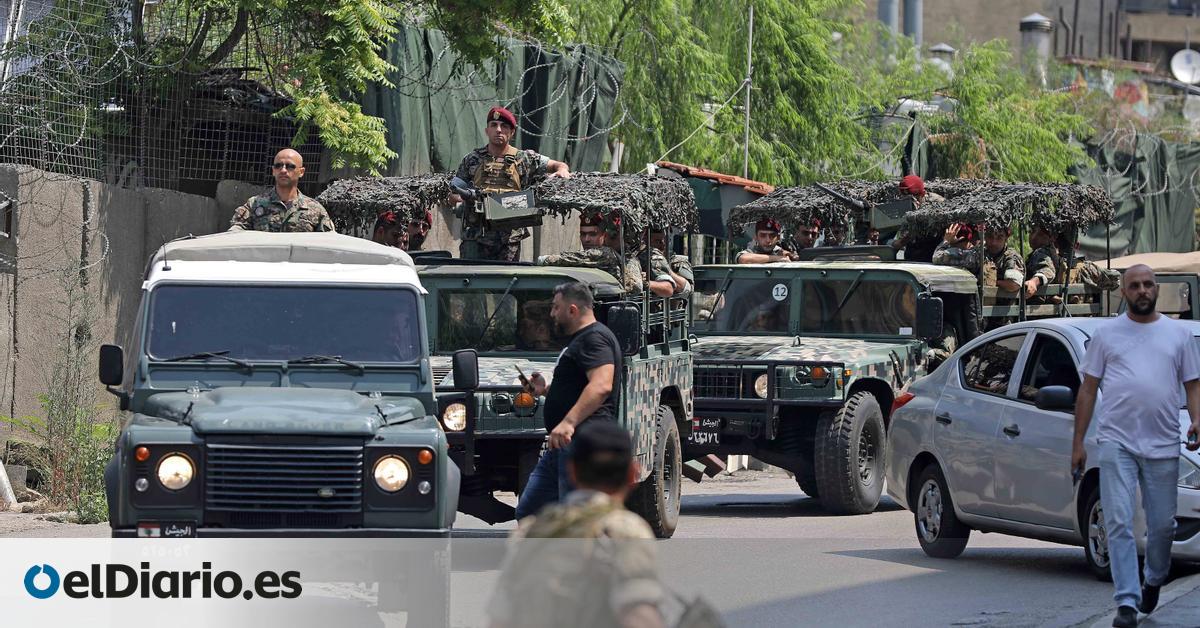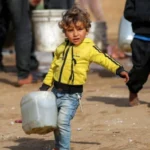
Summers in the Middle East are not only synonymous with heat, they are often also synonymous with war. The lack of progress in negotiations between Israel and Hamas to reach a definitive ceasefire in the Gaza Strip complicates the situation on Israel’s northern border, where exchanges of fire are taking place between its Army and the Lebanese Shiite militia Hezbollah. which has notably increased its attacks with projectiles and drones loaded with explosives against Jewish military bases and posts, which has caused multiple forest fires. Since the end of May, the Israel National Parks Authority estimates that “almost 40,000 dunams (just over 4,000 hectares) of land have burned in the north of the country.”
There, its residents and the more than almost 60,000 Israelis who continue to be evacuated since the Hamas attack on October 7 ask the Netanyahu Government to act and for its Army to invade southern Lebanon to push back Hezbollah, as it did in the 2006 war, although the current context is more volatile after eight months of a conflict in Gaza that has shaken the regional and international table.
“My enemy is not the Israeli Government. It’s not Hezbollah or Hamas either, it’s actually Iran. What we want is for our government to act against them,” she tells elDiario.es Sarit Zehavi, founder of the ALMA Research and Education Center, which monitors the situation in northern Israel daily. “We hear explosions every day. When we hear a drone we don’t know if it is one of theirs or ours and theirs are circumventing our defense systems. There are also constant rounds of rocket launches and not all of them are intercepted,” says the Israeli.
“Things have gotten worse,” explains the former director of Israel’s National Security Council, Eyal Hulata, during a virtual meeting with international journalists. “Until now Hezbollah had been careful in attacking cities in the north that it knew were evacuated and the Israeli Government had not wanted to open another front there, but everything can change in a few days,” the analyst points out.
For the advisor, Israel is not in the best moment to start a new war in Lebanon “not only because Hezbollah has projectiles and missiles that can reach almost any point in the country, but because the Army has less ammunition and anti-aircraft batteries available than before. on October 7,” he says. “However, if things continue like this it is only a matter of time before we have to act given that, in addition, the efforts made by American or French mediators in Lebanon are not having the expected success.”
Advisers to US President Joe Biden and those of his French counterpart, Emmanuel Macron, who have been traveling frequently to Beirut, assumed that a ceasefire in Gaza would serve as a starting signal for future negotiations between Israel and the militia group. Shia. But without an agreement, the fighting continues.
Since the beginning of cross-border hostilities, Hezbollah has recorded the deaths of some 340 of its fighters. In addition, nearly 90 Lebanese civilians have died from Israeli fire, sometimes loaded with white phosphorus, the use of which is restricted by international law and should never be used against civilian or populated areas, according to organizations such as Human Rights Watch or Amnesty International. . The use of this substance, which ignites upon contact with oxygen, has been alarming farmers in southern Lebanon for months, who have also suffered the burning of thousands of their arable hectares, possibly contaminated by the use of this incendiary weapon.
For its part, the Hebrew Army has confirmed the death of at least 15 soldiers and 11 civilians. A number of casualties considerably lower than that suffered by neighboring Lebanon, but with an enormous psychological impact among the thousands of Israelis who, eight months later, are still unable to return to their homes.
Abandoned by Netanyahu
This Thursday, the head of the Northern Command of the Israeli Army, Major General Ori Gordin, reiterated that his troops are ready for a possible total war against Hezbollah, ensuring that, when “they receive orders, the enemy will find a ready and strong Army.” His statements came hours after Prime Minister Benjamin Netanyahu expressed his willingness to wage a new war against the Lebanese group. “Whoever thinks that we will sit idly by is wrong. We are prepared for extremely strong action in the north. One way or another we will restore security in the north,” he assured in a visit to the troops provided in Kiryat Shmona, on the border with the neighboring country.
Many citizens of the Galilee have the perception that the State has abandoned the northern border while concentrating much of its military resources in the Gaza Strip. Among the discontents stands out the mayor of Kiryat Shmona, Avijai Stern, who, after Netanyahu’s visit to the area this Wednesday, said: “Now that the north is burning, the prime minister comes to show off, while the residents of this city “We no longer have the time, patience or money to put up with their political games.”

With more than 24,000 inhabitants Kiryat Shmona is the largest city in the Galilee, and for many years prior to the withdrawal from southern Lebanon in July 2000, it was the target of Hezbollah’s Katyusha rockets. “It seems that Minister (of National Security) Ben-Gvir and other leaders are also coming, and I am going to ask them to install large sprinklers and water cannons like the one at Kibbutz Tzova,” Stern added in relation to a kibbutz. nearby where they have been able to stop the flames generated by the projectiles.
The mayor denounced the lack of means to deal with the fire from sources that are inaccessible to firefighters and that must be fought with the help of seaplanes (in the summer of 2010 Spain sent several aircraft to Israel in a joint international effort to help the Hebrew State to extinguish what to date was the worst fire recorded in the country). He also expressed his indignation that Netanyahu did not notify him of the visit, but did call his predecessor in office, from the Likud party.
Everything indicates that Netanyahu wanted to avoid meeting Stern, given that the latter had criticized his management of the Gaza crisis in an interview published last month by the newspaper Haaretz, in which he invited the prime minister to leave the Government as the war ended. With the tourIn addition, ‘Bibi’ not only avoided the mayor on the same day, but also justified his absence at the ceremony held annually at the Ammunition Hill museum in Jerusalem to commemorate the victory in the Six Day War and the “reunification.” ” From the capital. There, reading the traditional kadishone of the most important prayers in the Jewish religion, was going to be the former deputy of the liberal Kadima party Shai Hermesh, who has publicly held the prime minister responsible for the death of one of his sons in the context of the October 7 attack.
Shekel weakness
In a context of increased tensions in the north and hours after a new attack by the Israeli Army in the Nuseirat refugee camp, in central Gaza, the Tel Aviv stock market recorded falls of around 1 on Wednesday. .5% in the main indices. Furthermore, the shekel weakened by approximately 0.6% against the main currencies, setting the exchange rate against the dollar at NIS 3.709 and at 4.03 against the euro, confirming that the oscillation of the market and exchange rates They are closely linked to the security situation, with values that are strengthened when the possibility of an agreement that ends the hostilities in Gaza and that ends with the release of the hundreds of hostages still trapped there approaches. “In our opinion, a ceasefire will favor the appreciation of the shekel to the level of 3.60-3.58 NIS, and later even higher,” Yossi Freiman, director of the Israeli financial risk management and investment group, recently said. FRICO to the Hebrew economic newspaper Calcalist.
According to this medium, investors in the Israeli market continue to monitor not only the situation on the Palestinian-Lebanese border after the latest incidents, but also what its leaders say. “Whoever thinks that he can harm us and that we will sit idly by is making a serious mistake. We are ready to take very strong measures in the north. “One way or another we will restore security,” Netanyahu said during his tour through northern Israel. Shortly after, the shekel registered losses.
Although the country’s economy usually resists well the economic challenges generated by the conflicts in which it is periodically immersed, what happened after October 7 is leaving its mark. In the last quarter of 2023, it contracted by approximately 20% due to the massive incorporation into the ranks of reservists – who left their positions vacant in industries and companies – and the displacement of more than 100,000 Israelis in both the south and the north, which which had a direct impact on the balance sheets of their places of residence.
However, economist Dany Bahar, a researcher in the Global Economy and Development program at the American Brookings Institute, believes that the current conflict will not generate long-term structural damage to the Israeli economy. “The problem you will face is another, and it is called the ultra-Orthodox community. A majority that neither participates in the Army nor is integrated into the labor market,” he explains.
In late May, around 130 Israeli economists signed a letter warning that the continued exemption from military service for the Haredi community will end up significantly damaging the country’s economy. By 2065, 50% of Israelis under the age of 14 are expected to come from this sector of the population (compared to 22% today). Without changes, they stated, “not only the economy is endangered, but the very existence of the State of Israel.”
Source: www.eldiario.es

